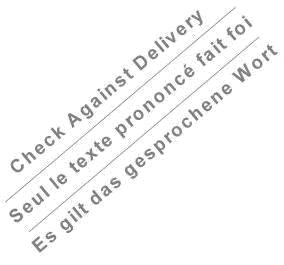Blue Innovation: Removing the bottlenecks for sustainable investment in our seas

Commissioner Damanaki presented today, together with Commissioner Geoghegan-Quinn, a Communication to drive the European maritime economy forward through innovation. Watch her Press Conference remarks below:
With land and freshwater resources under pressure, and oceans covering more than two thirds of our planet, we will have to rely more and more on the oceans and seas to provide sources for food, medicine and energy. This is why the Commission presented today an Action Plan for innovation in the "Blue Economy" to help use ocean resources sustainably and drive growth and jobs in Europe. For example, this could contribute to better knowledge of the ocean, better skills to apply new technologies in the marine environment and better coordination of marine research.
The maritime sector already employs 5.4 million people across Europe, working in professions as diverse as shipbuilding, tourism or offshore wind energy. But it could employ 7 million by 2020.
Important EU Research funding exists to help stimulate innovation. Between 2007 and 2013, the European Commission contributed an average of €350 million a year towards marine and maritime research through its seventh Framework Programme. Blue growth is a "focus area" in the new Horizon 2020 programme, with a specific €145 million budget for 2014-2015 alone, and further opportunities across the programme.
Find more information about the Communication here. Find examples of EU marine research as well as Questions and Answers. Read Commissioner's intervention below.

Blue Innovation: Removing the bottlenecks for sustainable investment in our seas
Press conference on Blue Innovation
Brussels, 8 May 2014
Good morning, ladies and gentlemen,
I'm delighted to be with Commissioner Geoghegan-Quinn today to share our plans to drive the European maritime economy forward through innovation.
Why do we do this Communication?
If we want our oceans to be a driver for jobs and prosperity tomorrow, we need to be ready today. This paper is about getting ready.
Would you invest in a piece of land without a map of the surroundings and without knowing what lies on it? No, nobody would.
By the same token, investing in our seas - and exploring it sustainably - is very difficult when we know less about them than we do about the surface of the moon.
So I want us to work on three areas in particular: assembling marine data, closer cooperation between Member States, and skills.
1) Marine data
The first thing we need to do to get ready is work on marine data. Our aim here is to create a map of the European seabed by 2020.
Mapping the seabed of our oceans will give both private companies and public authorities the information they need to cut the costs of surveys and to plan investments more effectively. We expect that such a map could generate an overall economic benefit of at least a billion euro a year.
2) Better cooperation
A second challenge is that maritime research efforts between EU countries are often not linked up. And we need to make the bridge between the results of research on one hand and the potential investors on the other, for innovation to come out of the lab and onto the market.
3) Skills
And third, we need a first-class labor market. For underwater technology, for state-of the-art wind turbines, for the use of algae in cosmetics, we need trained engineers, biologists, welders. So we extended the EU's Erasmus programme to allow transnational partnerships among education, training and youth institutions.
So in a nutshell…
…what we want is to remove any barrier preventing business from investing in the blue economy - including handicaps like unpredictability, knowledge gaps, lack of skills.
…but it goes without saying that that framework should at the same time protect the sea from any man-made harm.
I'm acutely aware of the dangers of an uncontrolled 'gold rush' towards the sea riches, so let me be clear: any growth that is not 100% sustainable would be absolutely irresponsible at this point.
I have been fighting for sustainable fishing in Europe for the last four years; I will not start tolerating any environmental compromises now in the maritime economy. Today's action plan is precisely about better coordination among EU nations with a common set of data, so that we can monitor what we do; and know the environmental implications of our actions.
And now over to Màire for the specifics of the research aspects of the plan.
Thank you.


